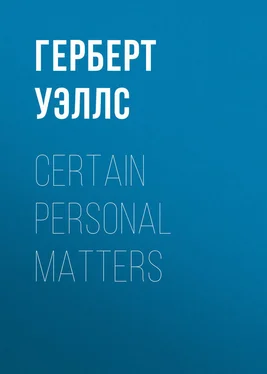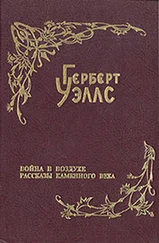Герберт Уэллс - Certain Personal Matters
Здесь есть возможность читать онлайн «Герберт Уэллс - Certain Personal Matters» — ознакомительный отрывок электронной книги совершенно бесплатно, а после прочтения отрывка купить полную версию. В некоторых случаях можно слушать аудио, скачать через торрент в формате fb2 и присутствует краткое содержание. Жанр: foreign_antique, foreign_prose, на английском языке. Описание произведения, (предисловие) а так же отзывы посетителей доступны на портале библиотеки ЛибКат.
- Название:Certain Personal Matters
- Автор:
- Жанр:
- Год:неизвестен
- ISBN:нет данных
- Рейтинг книги:3 / 5. Голосов: 1
-
Избранное:Добавить в избранное
- Отзывы:
-
Ваша оценка:
- 60
- 1
- 2
- 3
- 4
- 5
Certain Personal Matters: краткое содержание, описание и аннотация
Предлагаем к чтению аннотацию, описание, краткое содержание или предисловие (зависит от того, что написал сам автор книги «Certain Personal Matters»). Если вы не нашли необходимую информацию о книге — напишите в комментариях, мы постараемся отыскать её.
Certain Personal Matters — читать онлайн ознакомительный отрывок
Ниже представлен текст книги, разбитый по страницам. Система сохранения места последней прочитанной страницы, позволяет с удобством читать онлайн бесплатно книгу «Certain Personal Matters», без необходимости каждый раз заново искать на чём Вы остановились. Поставьте закладку, и сможете в любой момент перейти на страницу, на которой закончили чтение.
Интервал:
Закладка:
Then, I really must insist that young men do not understand the real truth about accomplishments. There comes a day when the most variegated wife comes to the end of her tunes, and another when she ends them for the second time; Vita longa, ars brevis – at least, as regards the art of the schoolgirl. It is only like marrying a slightly more complicated barrel-organ. And, for another point, watch the young person you would honour with your hand for the slightest inkling of economy or tidiness. Young men are so full of poetry and emotion that it does not occur to them how widely the sordid vices are distributed in the other sex. If you are a hotel proprietor, or a school proprietor, or a day labourer, such weaknesses become a strength, of course, but not otherwise. For a literary person – if perchance you are a literary person – it is altogether too dreadful. You are always getting swept and garnished, straightened up and sent out to be shaved. And home – even your study – becomes a glittering, spick-and-span mechanism. But you know the parable of the seven devils?
To conclude, a summary. The woman you choose should be plain, as plain as you can find, as old or older than yourself, devoid of social gifts or accomplishments, poor – for your self-respect – and with a certain amiable untidiness. Of course no young man will heed this, but at least I have given my counsel, and very excellent reasons for that counsel. And possibly I shall be able to remind him that I told him as much, in the course of a few years' time. And, by the bye, I had almost forgotten! Never by any chance marry a girl whose dresses do up at the back, unless you can afford her a maid or so of her own.
THE HOUSE OF DI SORNO
A MANUSCRIPT FOUND IN A BOX
And the box, Euphemia's. Brutally raided it was by an insensate husband, eager for a tie and too unreasonably impatient to wait an hour or so until she could get home and find it for him. There was, of course, no tie at all in that box, for all his stirring – as anyone might have known; but, if there was no tie, there were certain papers that at least suggested a possibility of whiling away the time until the Chooser and Distributer of Ties should return. And, after all, there is no reading like your accidental reading come upon unawares.
It was a discovery, indeed, that Euphemia had papers. At the first glance these close-written sheets suggested a treasonable Keynote, and the husband gripped it with a certain apprehension mingling with his relief at the opiate of reading. It was, so to speak, the privilege of police he exercised, so he justified himself. He began to read. But what is this? "She stood on the balcony outside the window, while the noblest-born in the palace waited on her every capricious glance, and watched for an unbending look to relieve her hauteur, but in vain." None of your snippy-snappy Keynote there!
Then he turned over a page or so of the copy, doubting if the privilege of police still held good. Standing out by virtue of a different ink, and coming immediately after "bear her to her proud father," were the words, "How many yards of carpet ¾ yds. wide will cover room, width 16 ft., length 27½ ft.?" Then he knew he was in the presence of the great romance that Euphemia wrote when she was sixteen. He had heard something of it before. He held it doubtfully in his hands, for the question of conscience still troubled him. "Bah!" he said abruptly, "not to find it irresistible was to slight the authoress and her skill." And with that he sat plump down among the things in the box very comfortably and began reading, and, indeed, read until Euphemia arrived. But she, at the sight of his head and legs, made several fragmentary and presumably offensive remarks about crushing some hat or other, and proceeded with needless violence to get him out of the box again. However, that is my own private trouble. We are concerned now with the merits of Euphemia's romance.
The hero of the story is a Venetian, named (for some unknown reason) Ivan di Sorno. So far as I ascertained, he is the entire house of Di Sorno referred to in the title. No other Di Sornos transpired. Like others in the story, he is possessed of untold wealth, tempered by a profound sorrow, for some cause which remains unmentioned, but which is possibly internal. He is first displayed "pacing a sombre avenue of ilex and arbutus that reflected with singular truth the gloom of his countenance," and "toying sadly with the jewelled hilt of his dagger." He meditates upon his loveless life and the burthen of riches. Presently he "paces the long and magnificent gallery," where a "hundred generations of Di Sornos, each with the same flashing eye and the same marble brow, look down with the same sad melancholy upon the beholder" – a truly monotonous exhibition. It would be too much for anyone, day after day. He decides that he will travel. Incognito.
The next chapter is headed "In Old Madrid," and Di Sorno, cloaked to conceal his grandeur, "moves sad and observant among the giddy throng." But "Gwendolen" – the majestic Gwendolen of the balcony – "marked his pallid yet beautiful countenance." And the next day at the bull-fight she "flung her bouquet into the arena, and turning to Di Sorno" – a perfect stranger, mind you – "smiled commandingly." "In a moment he had flung himself headlong down among the flashing blades of the toreadors and the trampling confusion of bulls, and in another he stood before her, bowing low with the recovered flowers in his hand. 'Fair sir,' she said, 'methinks my poor flowers were scarce worth your trouble.'" A very proper remark. And then suddenly I put the manuscript down.
My heart was full of pity for Euphemia. Thus had she gone a-dreaming. A man of imposing physique and flashing eye, who would fling you oxen here and there, and vault in and out of an arena without catching a breath, for his lady's sake – and here I sat, the sad reality, a lean and slippered literary pretender, and constitutionally afraid of cattle.
Poor little Euphemia! For after all is said and done, and the New Woman gibed out of existence, I am afraid we do undeceive these poor wives of ours a little after the marrying is over. It may be they have deceived themselves, in the first place, but that scarcely affects their disappointment. These dream-lovers of theirs, these monsters of unselfishness and devotion, these tall fair Donovans and dark worshipping Wanderers! And then comes the rabble rout of us poor human men, damning at our breakfasts, wiping pens upon our coat sleeves, smelling of pipes, fearing our editors, and turning Euphemia's private boxes into public copy. And they take it so steadfastly – most of them. They never let us see the romance we have robbed them of, but turn to and make the best of it – and us – with such sweet grace. Only now and then – as in the instance of a flattened hat – may a cry escape them. And even then —
But a truce to reality! Let us return to Di Sorno.
This individual does not become enamoured of Gwendolen, as the crude novel reader might anticipate. He answers her "coldly," and his eye rests the while on her "tirewoman, the sweet Margot." Then come scenes of jealousy and love, outside a castle with heavily mullioned windows. The sweet Margot, though she turns out to be the daughter of a bankrupt prince, has one characteristic of your servant all the world over – she spends all her time looking out of the window. Di Sorno tells her of his love on the evening of the bull-fight, and she cheerfully promises to "learn to love him," and therafter he spends all his days and nights "spurring his fiery steed down the road" that leads by the castle containing the young scholar. It becomes a habit with him – in all, he does it seventeen times in three chapters. Then, "ere it is too late," he implores Margot to fly.
Читать дальшеИнтервал:
Закладка:
Похожие книги на «Certain Personal Matters»
Представляем Вашему вниманию похожие книги на «Certain Personal Matters» списком для выбора. Мы отобрали схожую по названию и смыслу литературу в надежде предоставить читателям больше вариантов отыскать новые, интересные, ещё непрочитанные произведения.
Обсуждение, отзывы о книге «Certain Personal Matters» и просто собственные мнения читателей. Оставьте ваши комментарии, напишите, что Вы думаете о произведении, его смысле или главных героях. Укажите что конкретно понравилось, а что нет, и почему Вы так считаете.








